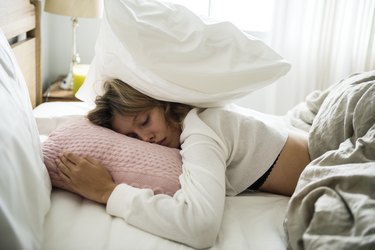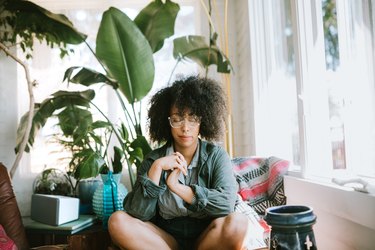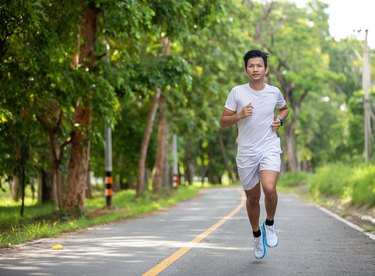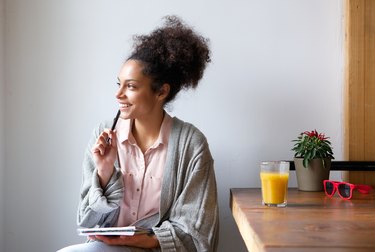
The morning after a night of heavy drinking, you wake up, dazed and confused…and weirdly anxious. You check your text messages. You clean up around your home. You drink water. And yet, you can't shake this nervous feeling that may feel overwhelming.
It's not your imagination. What you're experiencing is alcohol-induced anxiety, sometimes called hangover anxiety or "hangxiety."
Video of the Day
Video of the Day
There are many reasons you may suffer from these symptoms, especially if you're someone who deals with anxiety when you're sober, too. Here, we explore the causes behind these unsettling emotions, and more importantly, how to gain back control:
Why Does Alcohol Cause Anxiety?
1. It Messes With Your Brain
Booze can make you feel liberated and joyful, but too much can have the opposite affect on your mood and disposition. Alcohol interferes with the chemicals, or neurotransmitters, in the brain, says Ashley Loeb Blassingame, a certified alcohol and drug counselor and the co-founder of Lionrock, an online substance abuse recovery program.
More pointedly, alcohol can affect our serotonin levels, which are responsible for feelings of happiness and pleasure. "As the alcohol wears off, anxiety increases because the body is responding to it being sedated and, as a result, tries to find equilibrium," Blassingame says. "The hyperactivity, created by a chemical reaction to being sedated, leads to increased feelings of anxiety and uneasiness."
2. Hangover Symptoms Can Mimic Anxiety
Another reason alcohol can stimulate anxiety is due to dehydration and the next-day blood-sugar drop. Hydration and a stable blood sugar level are essential to our general brain function, so when these two are missing or compromised, Blassingame says, we could feel irritable, fatigued, nauseous or even experience heart palpitations.
"In the short-run, alcohol may seem to calm anxiety, but it's more detrimental to good mental health and wellbeing in the long-run," she says.
3. 'Blacking Out' Can Be Stressful
Furthermore, if you drink heavily, you could experience what some people call a 'blackout' — where they don't recall the events of the evening prior. It's reasonable that you would feel out-of-sorts the next day and worry about having a period of time where you can't remember anything, says Hanna Stensby, LMFT, a licensed marriage and family therapist.
"It makes sense that you would feel a sense of panic as you try to piece together what your actions were," Stensby says. "Not knowing what occurred or with who can leave you feeling anxious for a good reason."
Who Is More Prone to Alcohol-Induced Anxiety?
Some folks are calm, cool, collected and typically unphased by change or uncertainty. Others, however, would call themselves nervous by nature.
If you're in the latter group, Blassingame says you're more likely to experience anxiety after drinking alcohol.
Additionally, people who have health complications, including autoimmune disease or hypoglycemia, have a higher chance of feeling the jitters after heavy drinking because alcohol makes these conditions worse, she says.
"People who have weakened immune systems already have diverted biological resources to remove toxins from the body efficiently," Blassingame says. "Further impairing these processes through alcohol ingestion increases the symptoms, like anxiety and the general feeling of being hungover or 'worn down.'"
Also, if you're relatively healthy, eat a balanced diet and are physically active, you probably won't be as affected by hangover anxiety. But, Blassingame says, it's more difficult for the body to process alcohol efficiently if you're already struggling physically and mentally.
"People who are isolated, eat a diet high in carbohydrates and do not get enough exercise or sunshine tend to be much more susceptible to alcohol-induced anxiety and depression," she says.
How to Ease Anxiety After Drinking
To avoid these post-drinking blues and fears, there are a few proactive and reactive measures you can take. Here, experts provide their best insight:
1. Avoid or Reduce Your Alcohol Intake
This is the biggest no-brainer to avoid booze-related anxiety: Don't drink.
As Blassingame explains, you won't feel those symptoms if you're sober. If you do, it's likely general anxiety, and you can find treatment in the form of therapy, medications or stress-management techniques.
If you feel like you can't go without alcohol, consider reaching out to a mental health professional for help.
2. Focus on Hydration Before, During and After Drinking
If you don't feel reliant on alcohol and want to continue drinking occasionally in social situations, make sure you pay extra attention to your hydration levels. You can do this by increasing your water intake before, during and after ingesting alcohol of any form.
"This combats the dehydration caused by consuming alcohol. Drinking coconut water, which is high in electrolytes, is beneficial," Blassingame recommends.
You may have more frequent trips to the restroom — but you'll also feel better in the A.M.
3. Space Out the Days You Drink
It may be tempting to drink one (or several) glasses of wine every single night, but this habit isn't doing anything helpful for your mental state.
Blassingame says it's important to put several days in between consuming alcohol. "This gives the body a break and allows it to achieve homeostasis before having to process alcohol again," she explains.
4. Increase Your Brain-Derived Neurotrophic Factor
Brain-derived neurotropic factor, or BDNF, keeps neurons strong and helps regulate your metabolism, and it's linked to a lower risk of depression and other mental health disorders, according to a December 2015 paper in Archives of Medical Science.
Exercising, meditating and spending time outdoors or with friends and family all support BDNF, Blassingame says.
5. Practice Deep Breathing and Meditation
When you're suffering from alcohol-related anxiety, you also need in-the-moment strategies to get through it. Stensby recommends practicing deep breathing by inhaling for a count of four and exhaling for a count of six.
"Diaphragmatic breathing helps to enact and restore your nervous system, which will reduce anxiety and help you to balance your nervous system response," she explains.
Listening to a guided meditation or peaceful music while taking a shower or a bath will help ground you in the present moment, rather than fretting over yesterday's events.
"Focus on the sensations of the water and the peaceful sounds to increase a sense of calm," Stensby says.
Was this article helpful?
150 Characters Max
0/150
Thank you for sharing!
Thank you for your feedback!
Is this an emergency? If you are experiencing serious medical symptoms, please see the National Library of Medicine’s list of signs you need emergency medical attention or call 911.


